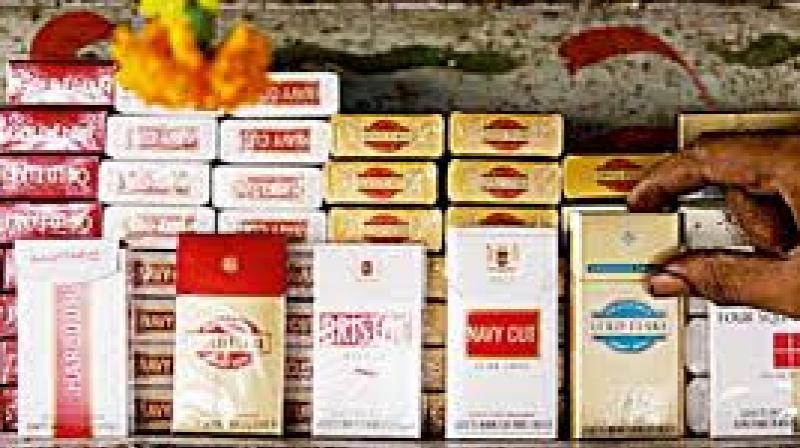Health groups seek highest possible tax levy on tobacco items

Kota: Ahead of a crucial GST Council meet on February 18, many public health groups have reached out to Union Finance Minister Arun Jaitley, urging him to ensure that all tobacco products especially bidis are placed in the demerit good category at the 28 per cent GST rate.
Besides, they have also sought an additional levy of the highest possible rate of cess on such tobacco products. These groups have also strongly recommended that tobacco products including bidis should be taxed at uniformly high rates under the new indirect tax framework expected to kick in from July 1 this year.
The delegation from Voice of Tobacco Victims (VOTV) has recently sent a memorandum to Jaitley and met the finance ministers of at least 20 states of the country. The move is significant as it comes just days ahead of the GST council meet which is expected to discuss the rate slabs for different goods and services under the GST mechanism.
With the total tax burden currently at 53 per cent, 19.5 per cent and 56 per cent, respectively for cigarettes, bidis and smokeless, tobacco taxation in India is much lower than the level recommended by the WHO, according to which the tax burden should represent at least 75 per cent of the retail price.
These groups also expressed disappointment that the Union Budget 2017-18 did not address this anomaly with an effective tax increase of 6 per cent, lower than at least the 10 per cent increase witnessed in previous budgets.
With 10 lakh tobacco triggered deaths every year, public health advocates believe that the government's taxation policies in the tobacco sector have left public health concerns unaddressed.
Classifying different tobacco products in lower rate GST slabs will be a distortion and will send a wrong message and promote the use of products like bidis, said Ashima Sarin,
director, Voice of Tobacco Victims (VOTV), adding bidis are the most commonly used tobacco product in India, accounting for 64 per cent of all tobacco consumption and aredisproportionately consumed by the poor.
Bidis contribute to the majority of the 10 lakh deaths attributable to tobacco as well as the staggering economic burden caused by tobacco use, she said. The excise increase proposed on tobacco products in the recent Union Budget of 2017-18 fell far short of even previous budgets, since the proposed increase in Additional Duties of Excise and Basic Excise duties (BED) on various tobacco products amounted to an increase of only 6 per cent in the current budget, the groups against tobacco consumption argued.
Most importantly like earlier years, the budget also failed to increase the excise taxes on tendu rolled hand-made bidis which almost 98 per cent of the bidis smokers consume instead increasing it on paper-rolled bidis which has a negligible market share ?- once again keeping bidis a very affordable and practically unregulated poison for its 67.5 million bidi users, according to health groups.
Rijo John, Assistant Professor, IIT Jodhpur said, "The tobacco industry knows how to exploit its consumers and this is why it increases prices much more than the tax increases that the government proposes every year.
It is unfortunate that the government doesn't take a cue from this and increase taxes on tobacco products substantially." As against a normally expected 10-15 per cent increase in taxes on tobacco products, a mere increase of 6 per cent announced in the budget is a boon to the tobacco industry.
Unless corrective measures are taken in the impending GST by bringing all tobacco products under the highest demerit rate of 28 per cent plus the highest possible cess, it would be a severe blow to the public health in India," said Pankaj
Chaturvedi, Oncologist, Tata Memorial Hospital, Mumbai, who was recently in Kota sees no logic in giving tax subsidy to a product that carries a product warning that it kills. "In fact, it is the cheapest and unregulated poison currently available in the market," Chaturvedi said adding with current tax pattern, consumer and the nation are losers, whereas handful of business families (bidi and chewing tobacco industry owners) are making vulgar profits by selling this weapon of mass destruction.
"Tobacco consumption has reached a dangerous level and requires immediate attention by law makers," he said. According to Global Adult Tobacco Survey (GATS), India has the second largest number of tobacco users (275 million or 35 per cent of all adults in India) in the world - of these at least 10 lakh die every year from tobacco related diseases.
The total direct and indirect cost of diseases attributable to tobacco use was a staggering Rs 1.04 lakh crore (USD 17 billion) in 2011 or 1.16 per cent of India's GDP.
Approximately, 48 per cent of men and 20 per cent of women consume tobacco (35 per cent of the adult population overall) -?of these at least 10 lakh are dying each year from tobacco related diseases.
Bidis comprise 48 per cent of the tobacco market, chewing tobacco 38 per cent and cigarettes 14 per cent so it is evident that bidis account for a significant portion of those deaths.

